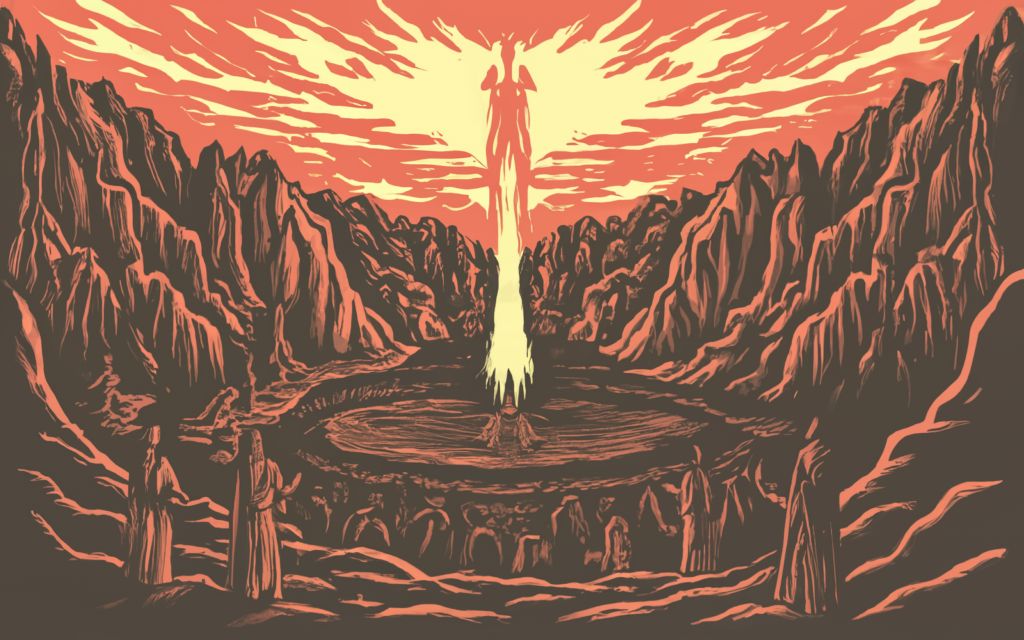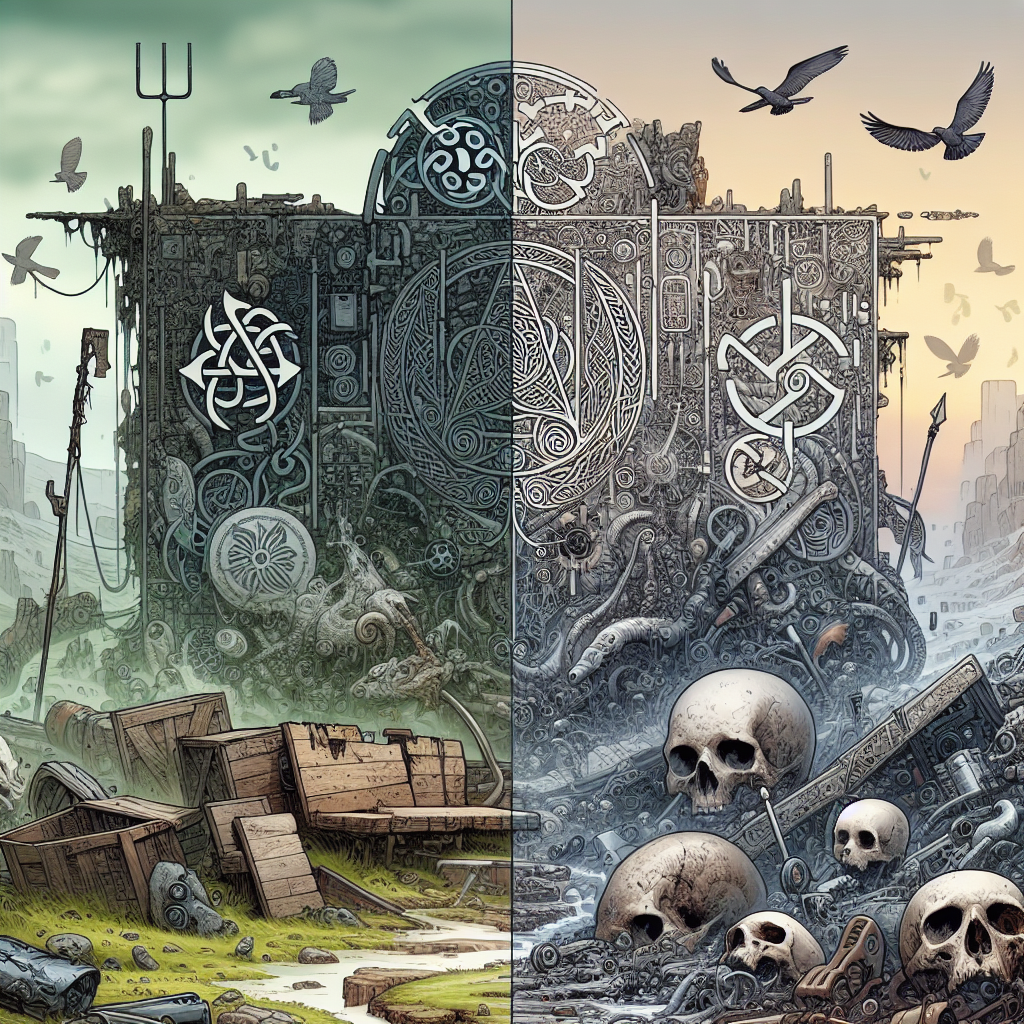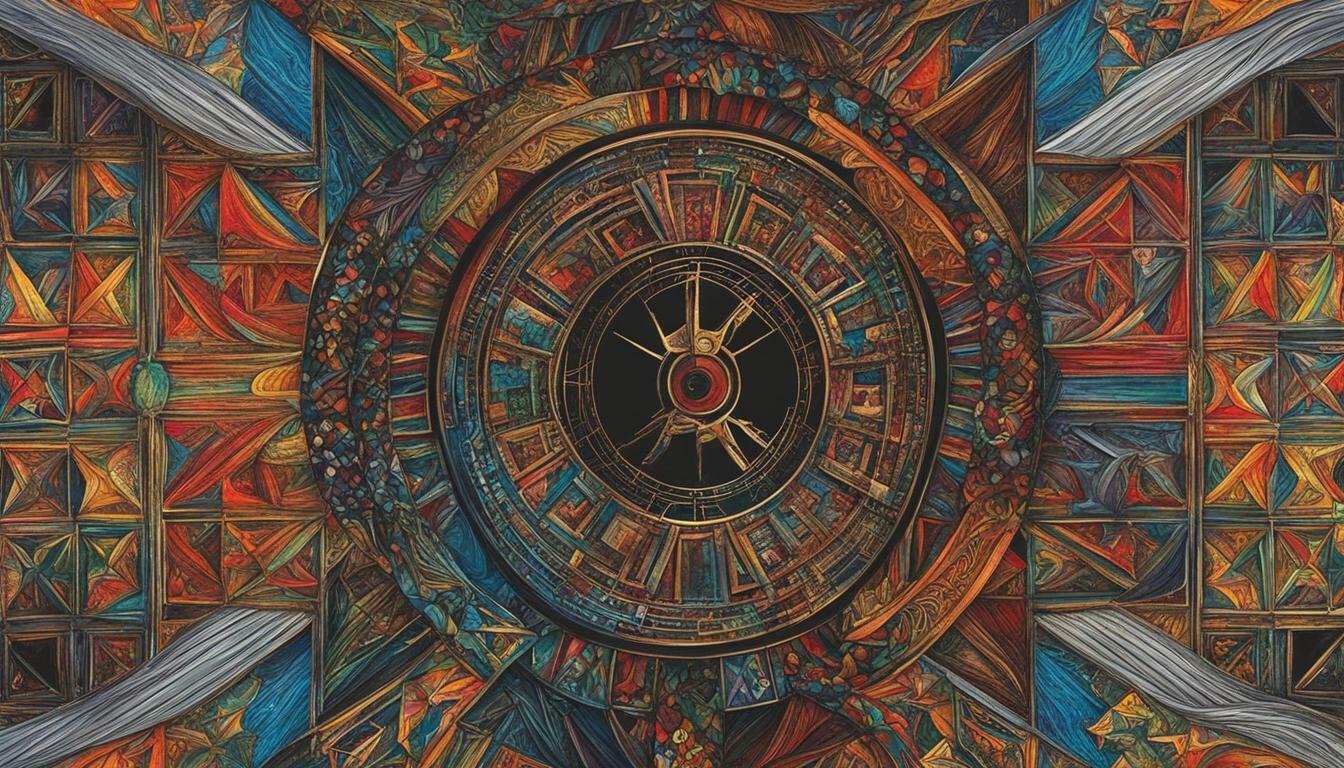Introduction: A Quick Peek into the Afterlife
The Great Beyond – More than Heaven and Hell
When it comes to the concept of afterlife, most people tend to envision a binary system: heaven for the virtuous souls and hell for the sinful ones. But what if there were more layers to this ethereal onion? This is where Purgatory and Limbo come in – two fascinating and often misunderstood aspects of afterlife that offer more nuanced shades to our black-and-white understanding of life after death.
Purgatory vs Limbo: A Brief Overview
In Catholic theology, Purgatory refers to an intermediary state between earth and heaven where souls undergo purification so as to achieve the sanctity necessary for entering into heaven. It’s kind of like a spiritual waiting room or an ethereal detox center, if you will, where souls make amends before they can move up into eternal bliss. On the other hand, Limbo is considered as either a temporary place or state of rest for virtuous non-Christians (Limbo of Patriarchs) or a permanent condition of natural happiness enjoyed by unbaptized babies (Limbo of Infants).
It’s not exactly heaven because there’s no direct communion with God but it isn’t hell either because there’s no torment. Imagine it as a cosmic green room where folks chill out catching up on celestial Netflix while they await their final call.
Purgatory 101: Not Quite Heaven, Definitely Not Hell
The Genesis of Purgatory: A Historical Excursion
Purgatory, a concept cloaked in mystery and intrigue, originated in the Western church and is most prominently embraced by the Roman Catholics. While it doesn’t make a grand, explicit appearance in the Bible, its roots are traced back to biblical passages such as 1 Corinthians 3:11-15 which suggests a purifying fire after death. The term ‘purgatory’ itself burst forth into theological discourse around the 12th century, derived from Latin’s ‘purgare,’ meaning to clean or purify.
Purgatory’s Mission: The Metaphysical Laundromat of Souls
So what exactly is Purgatory? I like to think of it as a celestial laundromat for souls.
Its purpose isn’t eternal damnation but purification for those who died in God’s friendship but still needed some spiritual decluttering – kind of like a divine detox. Essentially, it serves as an interim before souls ascend to Heaven where nothing unclean can enter (Revelation 21:27).
The Standard for Purgatorial Admission: Applicants Wanted?
Now you might be wondering “Who has to punch this otherworldly time card?” Well, contrary to common misconceptions, Purgatory isn’t an option on the menu for every soul departing this mortal plane. Those who have died in the state of grace but aren’t quite immaculate enough yet for a straight shot into Heaven are primarily its occupants. It’s not about punishment; rather it’s about preparing these souls for entry into Paradise.
Sojourn in Purgatory: The Divine Stopover with An Open-Ended Itinerary
Thinking about how long one might have to hang out in Purgatory? It’s somewhat of a divine mystery.
According to Catholic doctrine, the duration isn’t finite like our earthly understanding of time. It’s more about the process—cleaning up, straightening out and preparing for Heaven.
The prayers of the living can aid this process, another reason Catholics pray for their departed loved ones. In essence, Purgatory is less about the ticking hands of celestial clocks and more about spiritual readiness for eternal bliss.
Limbo Land – The Ultimate Waiting Room
Origins of Limbo: A Divine Twist of Fate
The concept of Limbo, much like its celestial sibling Purgatory, finds root in Catholic theology. However, it’s not explicitly mentioned in the Bible.
The word ‘Limbus’, Latin for ‘edge’ or ‘boundary’, was used by medieval theologians to describe the periphery of hell, a place distinct from its fiery depths. It’s worth noting that liminality has been a fascination across numerous cultures and belief systems – a realm betwixt and between the absolutes.
 Who’s Chilling in Limbo? Life’s Innocent Bystanders
Who’s Chilling in Limbo? Life’s Innocent Bystanders
The question of “Who ends up there?” has been shaped by centuries of theological debate and ecclesiastical decision-making. Initially, Limbo was divided into two parts: “Limbus Patrum” (limbo of the fathers), for righteous people who died before Christ’s resurrection, and “Limbus Infantium” (limbo of infants) for unbaptized babies. Over time though, the former faded away with the idea that Christ “descended into hell” to free these souls. The latter held on stubbornly due to Church doctrine stating Baptism is essential for salvation.
The Nature of Existence in Limbo: An Eternity on Hold?
What is it like to be stuck in endless waiting? Well, according to popular Catholic interpretation, those in limbo don’t undergo any punishment other than separation from God; they’re believed to enjoy a state akin to natural happiness but devoid of supernatural beatitude i.e., sighting divine essence. This blissful ignorance might seem rather pleasant until you remember that it lasts forever and lacks what believers consider humanity’s ultimate goal – union with God.
Interestingly enough though, this rather unconventional form of afterlife real estate has been subject to re-evaluation and even retirement in recent times. When it comes to the mystery of what happens after death, it seems our maps are still being drawn.
The Unseen Parallels: Similarities Between Purgatory and Limbo
Despite their unique characteristics, there is a confluence of thought when it comes to Purgatory and Limbo. Both realms are seen as intermediary stations, not the final destinations like Heaven or Hell. They are temporary abodes for souls awaiting judgement or destined for an alternative fate.
In both theological constructs, time functions differently than in our earthly perception, often described as timeless or eternal. Furthermore, Purgatory and Limbo provide solutions to theological quandaries – they serve as places for the innocent yet unbaptized (Limbo) or those who died without fully atoning for their sins (Purgatory).
Dissecting the Details: Differences That Set Them Apart
While similarities are present, the idiosyncrasies between these two afterlife locales cannot be ignored. One of the most striking differences lies in their purpose.
Purgatory is akin to a refining fire – its existence predicated on purging remaining sins and preparing souls for ascension into Heaven. In contrast, Limbo does not offer this purgatorial purification process – it exists instead as a place of natural happiness with no hope of experiencing the beatific vision that Heaven offers.
The nature of existence varies greatly between these two states too. Souls in Purgatory endure purgation through suffering which expiates sins while ultimately aiming towards blessedness; however, inhabitants of Limbo experience neither exquisite joy nor exquisite torment but remain in an unending state of ‘perfect natural happiness.’
One can look at who qualifies to reside where – all souls requiring purification go to Purgatory while unbaptized infants (according to some interpretations) and virtuous non-Christians find themselves in Limbo. In essence, while Purgatory and Limbo share the role of being intermediary states, their purpose, inhabitants’ experiences, and eligibility criteria set them distinctly apart.
The Great Split: Disputes Within Religious Circles
Like any multifaceted concept, the notions of Purgatory and Limbo have not been without their share of controversies and debates. These controversies are not only between different religions but also within the same faith community. While Catholics prominently recognize Purgatory as a halfway house for souls to purge their sins before reaching Heaven, Protestants typically refute this, believing instead in the direct ascension to Heaven or descent into Hell post mortem.
The concept of Limbo further muddies theological waters. Traditionally seen as a permanent place for unbaptized infants and righteous pagans who passed before Christ’s arrival, it was often seen as a softer alternative to consigning such souls to eternal damnation.
However, over time this belief has been challenged by several theologians within Catholicism itself. The Church’s stance on Limbo has oscillated from endorsement in the Middle Ages to uncertainty in recent years—with Pope Emeritus Benedict XVI suggesting it may be more hopeful to believe that such souls would ultimately find salvation.
Modern Interpretations: Evolving Views on Afterlife
In an era of rapid scientific progress and increasing secularism, views on Purgatory and Limbo are evolving dramatically. The traditional fiery images of Purgatory depicted in Dante’s “Divine Comedy” are giving way to more metaphorical interpretations—a refining fire purifying one’s soul rather than roasting one’s corporeal form. Some modern theologians view Purgatory less as a physical location than a spiritual process or state.
Modern interpretations of Limbo have evolved similarly toward metaphorical leanings—often seen as more representative of existential states than actual locations in the afterlife. Some psychologists draw parallels between Limbo and states of ambiguity or uncertainty in our lives, where we are neither here nor there, much like the souls in Limbo.
This shift from literal to metaphorical interpretations represents a broader trend towards more individualistic and personal approaches to spirituality and the afterlife. Yet, despite these shifts, the enduring fascination with Purgatory and Limbo underscores humanity’s timeless curiosity about life after death—a quest for answers that continues to spark imaginations and fuel debates.
A Sojourn Into The Spirit Realms : Summing Up Purgatory And Limbo
Our journey into the shadowy ether of theology has been nothing short of enlightening. We discovered that Purgatory, far from being a haven for eternal torment, is essentially a spiritual purging platform – an ethereal ‘detox’ facility, if you will – where souls undergo purification before ascending to heaven. Its concept stems from the belief in God’s mercy and justice and is seen as an extension of his love.
Limbo, on the other hand, while also not a place of punishment per se, is often depicted as a peaceful realm where unbaptized infants and virtuous pagans reside. It’s a celestial waiting room for those who didn’t quite ‘meet the criteria’ for heaven but were too innocent or virtuous for hell.
The Relevance Of The Afterlife: Why Understanding Purgatory And Limbo Matters Today
Navigating these theological concepts might seem like a fascinating intellectual exercise – one that provides ample fodder for late-night philosophical debates. But their significance extends beyond academic curiosity or religious doctrine.
Underlying these concepts are questions about justice, morality, innocence, suffering – all topics that are fundamentally human and universally relevant regardless of one’s beliefs or lack thereof. They challenge us to contemplate our understanding of divinity and existence beyond this earthly plane.
Understanding such beliefs offers insight into how different cultures grapple with life’s big questions and contributes to our collective narrative about death and the afterlife. Moreover, it promotes tolerance by fostering an appreciation for diverse perspectives on existential matters within our global community.
So next time you ponder the mysteries of existence or find yourself engaging in spirited discussions about what awaits us beyond this mortal coil, remember: there’s more to the afterlife than just heaven and hell. There’s Purgatory.
There’s Limbo. And there are countless other interpretations, each contributing a unique piece to the fascinating puzzle that is our human understanding of life, death, and beyond.
A Peculiar Journey through the Spiritual Spectrum
Purgatory and Limbo, two fascinating concepts that have captured the hearts, souls, and minds of believers for centuries. But aside from their metaphorical offerings to spiritual discourse, they also come with a treasure trove of intriguing tidbits that add to their allure.
Purgatory in Popular Culture: More Than Just a Religious Idea
Purgatory has found its way into popular culture in more ways than one. It has served as a backdrop for various literary works, movies, and TV shows.
Dante Alighieri’s “The Divine Comedy,” a cornerstone of Italian literature, offers an intricate and poignant portrayal of Purgatory. And it doesn’t stop there – the concept has even been incorporated into graphic novels like Mike Mignola’s “Hellboy.”
Pets in Purgatory: A Quirky Question Mark?
Ever wonder if Fido or Whiskers will be spending time in purgatorial flames? The answer is not so clear-cut!
According to some interpretations of Catholic doctrine, animals don’t have rational souls and thus cannot sin or merit divine reward – therefore no purgatory for them. However others argue that God’s love extends to all his creatures – so who knows?
Limbo: A Concept Without Consensus
As much as Limbo is studied and discussed today, believe it or not – it was never officially recognized by the Catholic Church as part of its doctrine! The idea came from theologians musing over the fate of unbaptized infants who were innocent but technically stained by original sin.
A Surprising Patron Saint?
Did you know there might be a patron saint for babies in Limbo? Medieval theologians speculated that the Old Testament righteous, especially the prophet Jeremiah, acted as a sort of guardian for souls in Limbo.
Limbo in Linguistics: A Term of Suspension
Quite apart from religious discourse, the term ‘limbo’ has been borrowed by many languages to depict a state of suspension or uncertainty – a testament to its universal appeal and applicability. The phrase “in limbo” is used globally to signify being trapped in an indeterminate state or place. These handful of fun facts reveal how Purgatory and Limbo not only occupy our spiritual imaginations but also permeate our language, culture and even our daily conversations!
 Skip to main content
Skip to main content



